A Sangha Retreat in Preparation for the New Year
Hello! The year 2022, the Year of the Tiger, has begun.
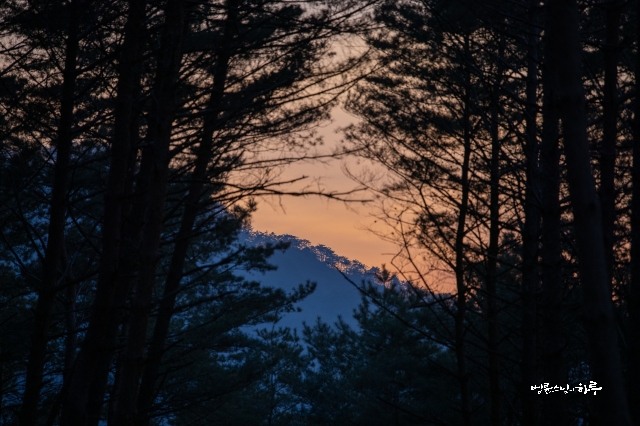
At 4:30 am, live-streaming of the 1,000-Day Practice began. As usual, Ven. Pomnyun Sunim participated in the practice, which proceeded in the order of the Yebul ceremony (Paying Homage to the Buddha), Vows to the Threefold Refuge, Words for Practice, Chamhoe (Repentance), 108 Bows, Meditation, and Daily Reading. Jungto Society members also joined the live-streamed 1,000-Day Practice in their rooms on New Year’s Day.
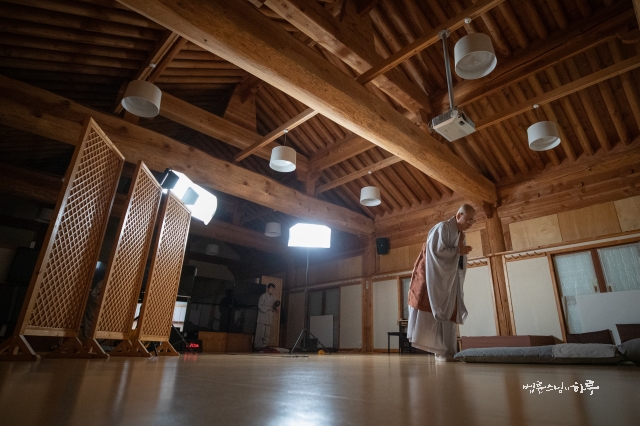
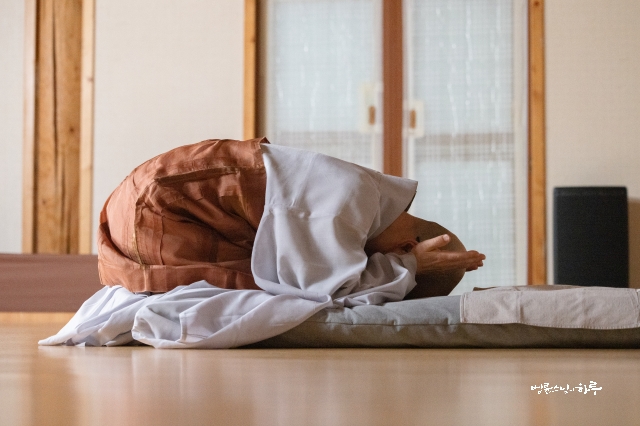
The practice ended with the Four Great Vows and Ven. Pomnyun Sunim gave a Dharma talk for the new year.
“How did your morning practice go? The year 2022 has begun. A lot of things happened last year. Widespread outbreaks of COVID-19 caused colossal hardships in our daily lives and we had to adjust to “living with COVID-19.” The year 2022 has arrived, with no end in sight to the coronavirus pandemic.
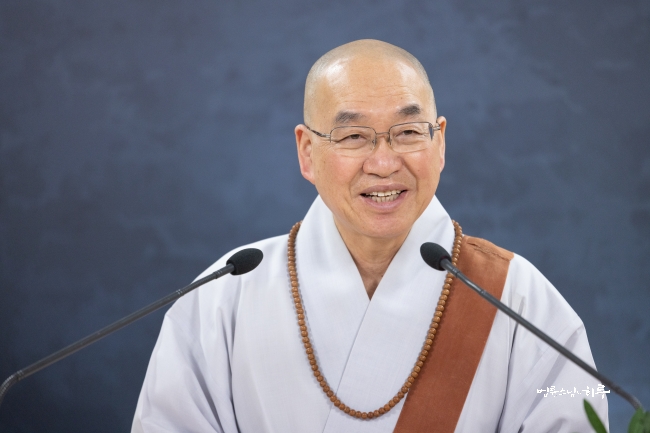
“The year 2022 is also the last year of our 30-year-long first 10,000-Day Practice. I hope you cope well with whatever challenges you may face in the coming year. Having life turn out the way you want doesn’t bring true freedom and happiness. True freedom and happiness mean that you are not hindered by, attached to, and do not succumb to any obstacles in life. Only when you accomplish this, will you be truly free and happy.
“As we near the end of our first 10,000-Day Practice, Jungto Society has decided to spread the Dharma to 10,000 people as a way of paying back to society. Considering the last year of our first 10,000-Day Practice as the year of spreading the Dharma, I ask you to do your best in spreading the Dharma so that many more people can benefit from the wonderful teachings of the Buddha.
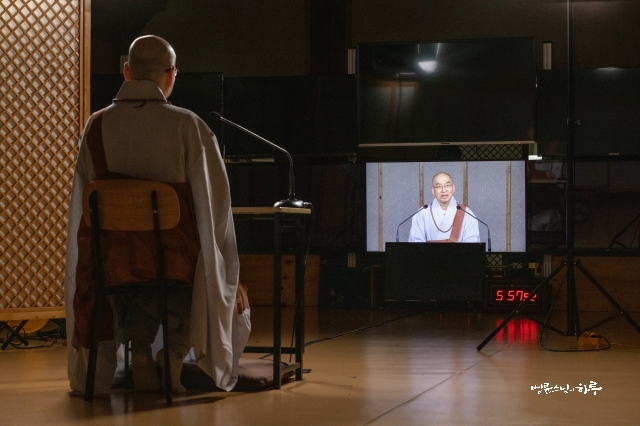
Three life indicators
“Whatever we do, the most important element is people. The most important thing for a practitioner is to be free and happy. If you try to be perfect, you can easily be harsh toward yourself. On the other hand, if you let yourself slide, you can easily become harmful to society. Therefore, we should always examine ourselves and value our lives by avoiding these two extremes. To do this, we need to remain self-aware. While staying rooted in self-awareness, we shouldn’t be pushed around by our desires, by our propensity to do things our own way, or by flawed perception that discriminates between right and wrong according to a thought we are caught up in. We suffer when we give in to our desires, our propensities, our discriminative perception. So we need to control our desires. Based on the practice of self-control, we need to have the master mentality, making choices for our lives and accepting the consequences of those choices. In other words, we need to live autonomously. The Buddha said: “Be your own refuge, having no other.
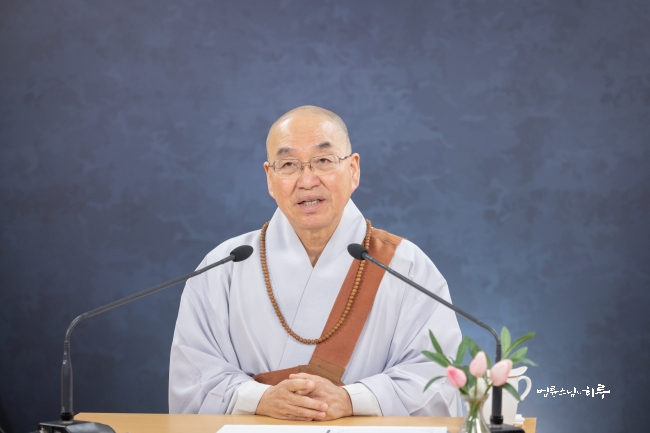
“In sum, self-awareness, self-control and autonomy are important. This year, I hope you keep your life pure and bright by using these three life indicators.
Sangha members will continue their practice until tomorrow and start working officially on Monday, Jan. 3rd. I’ll see Dharma volunteers at the Monday Dharma meeting and see all Jungto Society members at the Wednesday Dharma meeting when we’ll have our annual kickoff meeting to talk about the direction Jungto Society is heading this year.
“In 2022, I hope you achieve the aspirations of Jungto practitioners: individuals who are happy, a society that is peaceful, and nature that is preserved. Let’s work together so that we have peace in our families and safety and stability in our society.
“I wish you a Happy New Year, see you next week.”
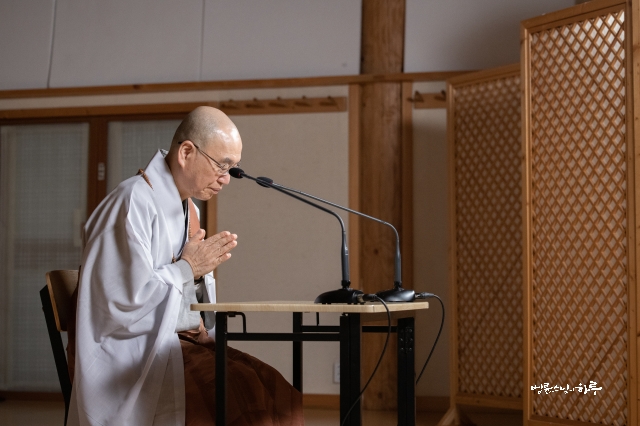
We began the New Year enthusiastically while engraving these three words in our hearts and minds: self-awareness, self-control, and autonomy.
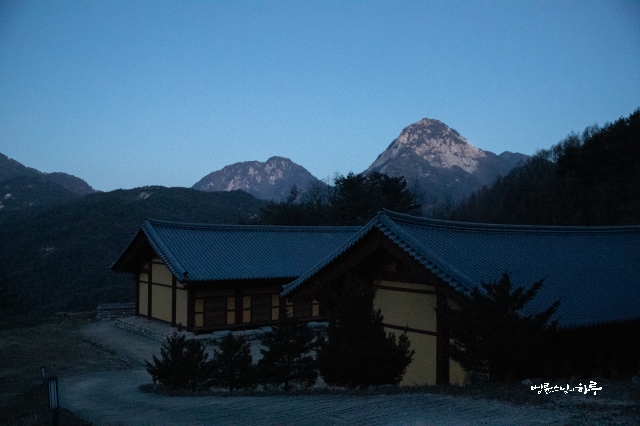
As soon as the live-streamed practice was over, Ven. Pomnyun Sunim left Mungyeong Jungto Retreat Center and headed for Bonghwa Retreat Center. About 50 Sangha members, who had been participating in the retreat for the New Year, were waiting for him there.
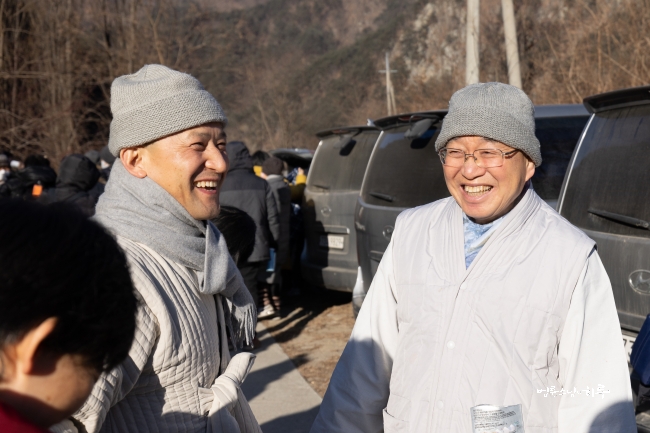
After a two-hour drive, Sunim arrived at Bonghwa Retreat Center. Sangha members greeted him with three bows.
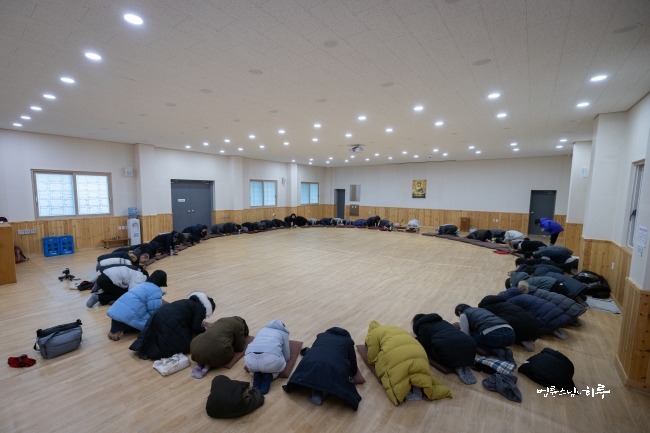
“I heard on my way here that those who had decided to leave the sangha after this retreat have retracted their decisions. We’ll talk about this in the afternoon. Let’s take a walk along the Nakdonggang in the morning. Now, let’s go to Yangwon Station.”
The trainees who were to leave the Sangha went forward and bowed to Sunim three times.
“Sunim, we’re very sorry for the concern we’ve caused.”
“Let’s take a walk first.” (Laughter)
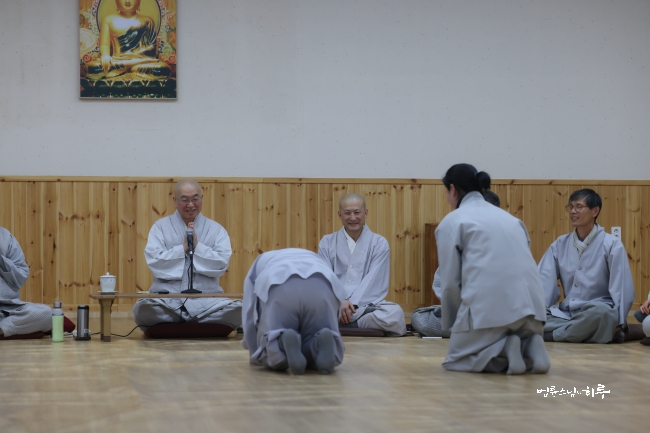
At 8:40 am, everyone got in the car and headed for Yangwon Station.
“Oh my, the Sun has already risen. We could’ve watched the Sun rising from the mountain near the retreat center . . .”
One of the trainees who was planning to leave the sangha said:
“It’s alright to miss the sunrise because the Sun has already risen in my heart.”
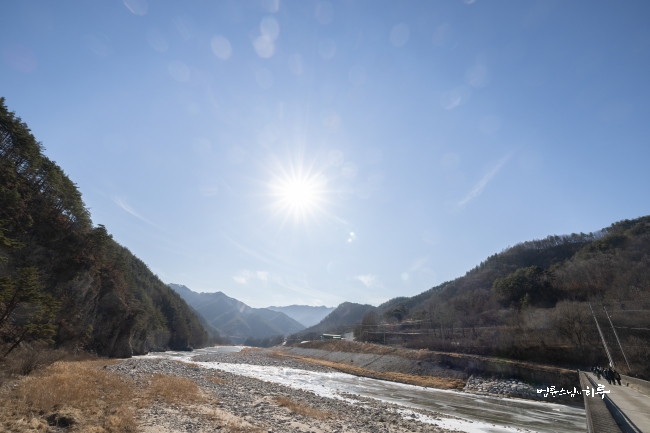
After arriving at Yangwon Station at 9:20 am, we began to walk. Everybody’s faces were radiant because we had just finished meditation and retreat.
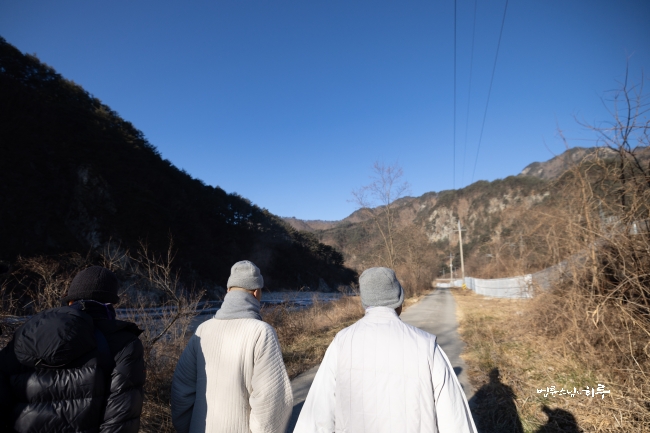
We walked along the narrow gorge known as a place with a nine-square-meter-wide sky and land. As we walked, Sunim exclaimed:
“Wow, look at the scenery. Isn’t it beautiful?”
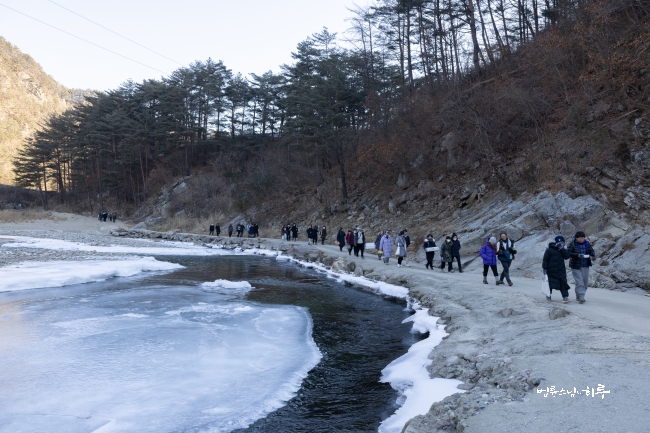
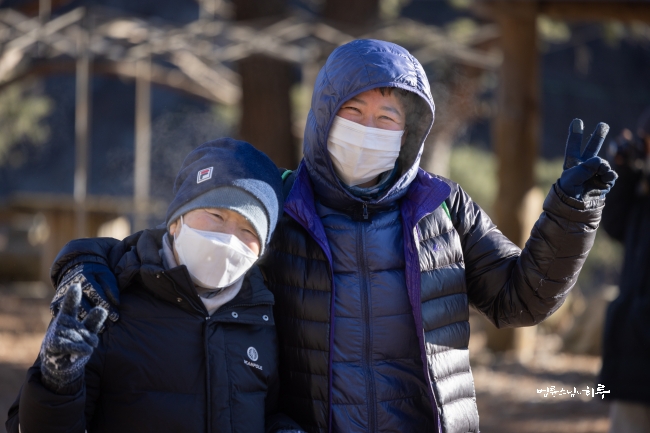
After walking on the level ground around the foothills for about 30 minutes, we came to a wide-open area. The weather was very cold, so we decided to warm up and have some snacks in the sun. After the snacks, Sunim asked us to sing.
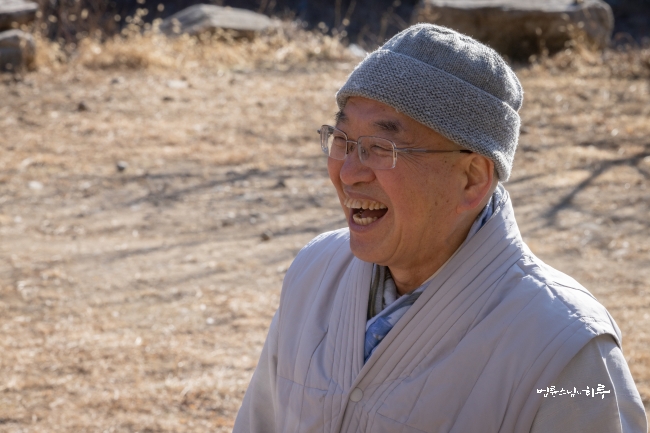
“Which team worked the hardest last year?”
“The media team.”
“Media team, come to the front and sing a song!”
As we named the teams that worked hard and the named teams sang a song one by one, all of the teams ended up singing. Each of us played a different role, but all of us worked hard and we gave everyone a big round of applause.
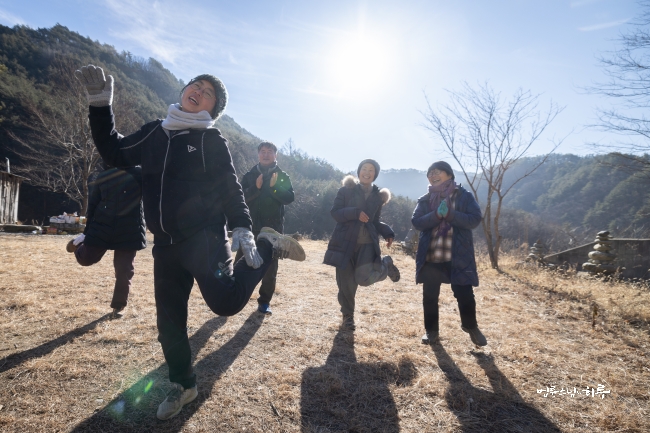
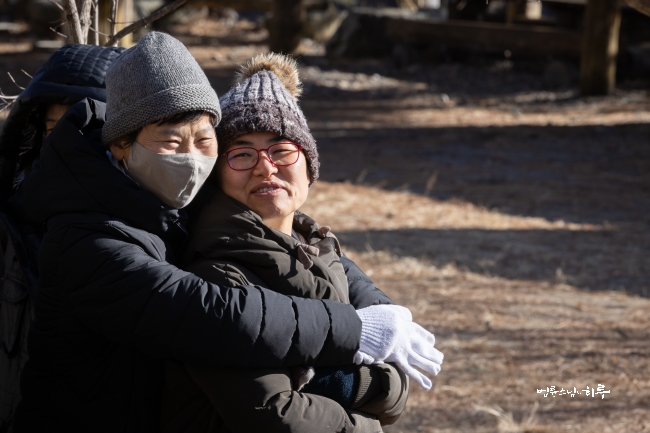
After singing, we continued our walk. The river was frozen solid as the temperature was –11℃.
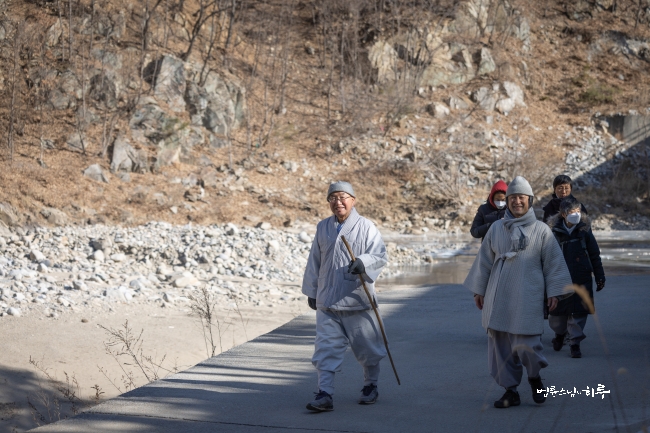
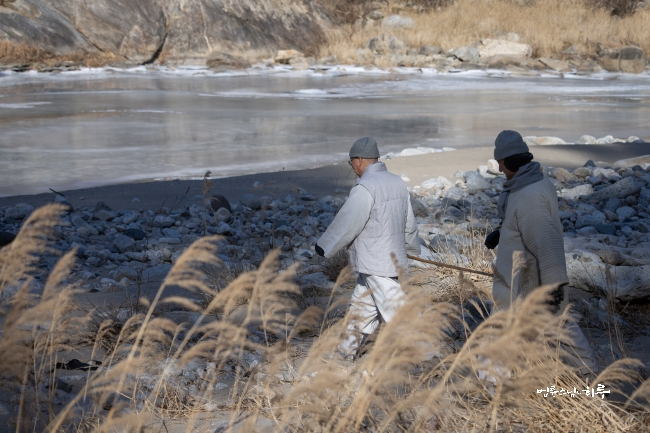
“Let’s walk on the ice.”
We ran onto the ice to kick a shard as if we had returned to childhood. We laughed hard whenever someone fell down.
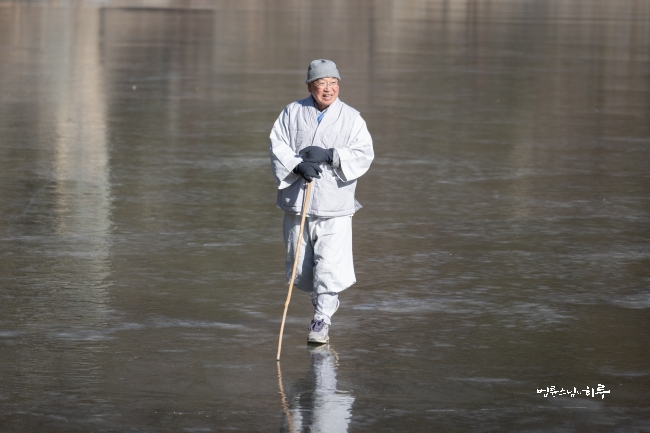
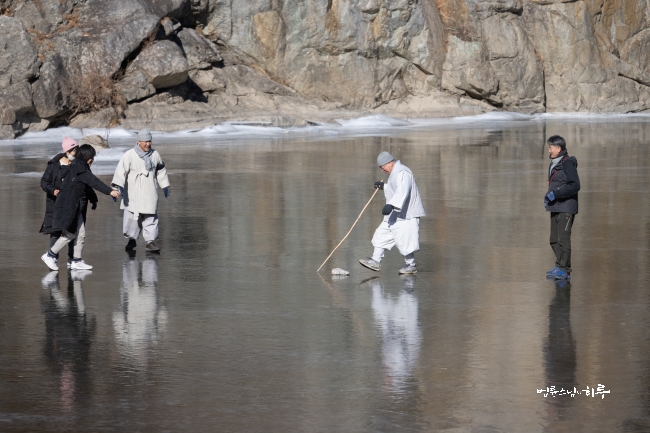
After crossing the river on a railroad bridge, we continued our walk while feeling the mountains, river, and rocks with our whole body.
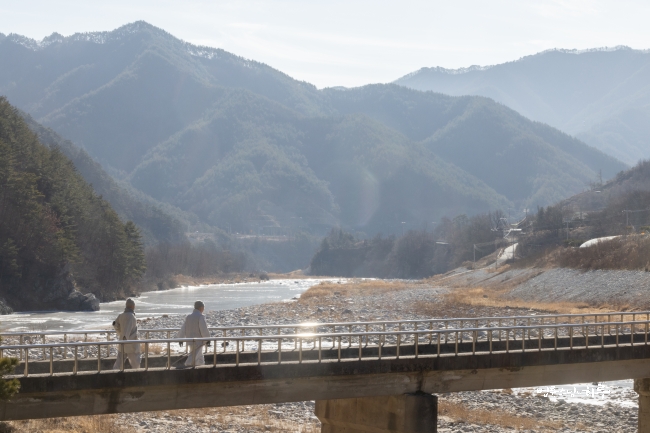

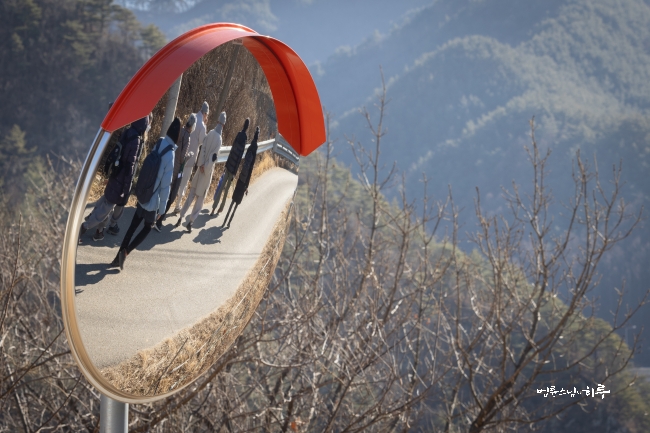
“Here we are. This is Buncheon Station.”
While walking with Sunim on New Year’s morning, we shared our deepest feelings and thoughts with each other, which we were unable to do in our daily lives.
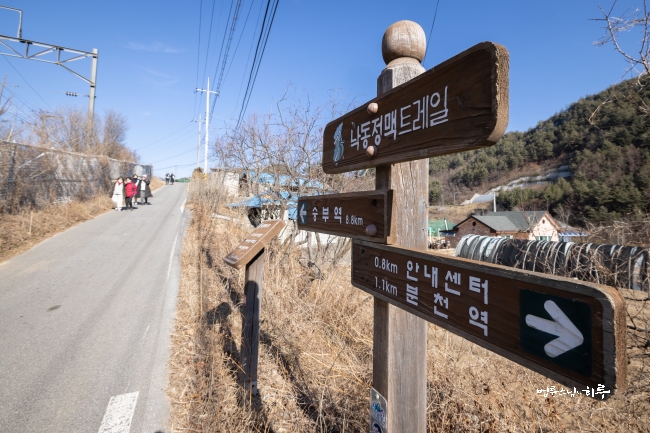
After returning to Bonghwa Retreat Center, we had a dialogue with Sunim from 2:30 pm. Sangha members were divided into five groups after the meditation retreat and continued the semi-annual retreat for Jungto practitioners to help each other become better practitioners. First, the Dharma teachers who led each group’s retreat briefly introduced the topics they talked about in-depth.
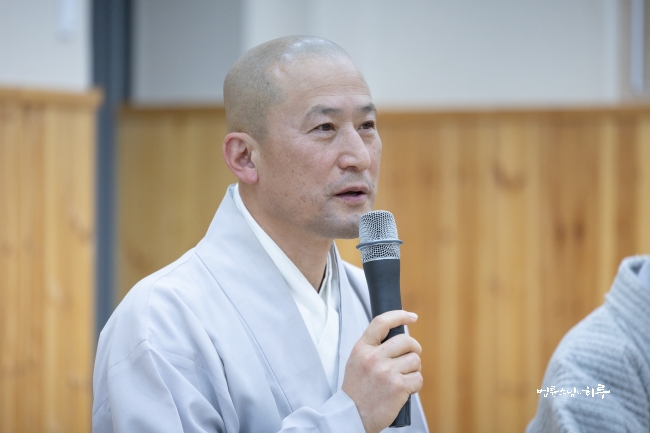
“Our group consisted of people who have been with the sangha for a long time and are in charge of their departments. Most of them said it is hard when they feel that they are unappreciated or ignored, or communication is poor. One even said that she was wondering if she was of any help to Jungto Society. We talked about the attitude we should have when we feel we are not appreciated by Jungto Society, even if we think we did our best.”
“In our group, one of them talked about holding a grudge against another person for what he or she said. Another said that she couldn’t help blaming the other person even though she knew it was her problem intellectually, but if she tried to recognize that it was her problem, she ended up blaming herself and going back and forth between self-blame and blaming the other person. We talked a lot about the attitude we should have when we fall into a state of self-blame. In this process, we gave each other an assignment: “Be aware of your thoughts and feelings.”
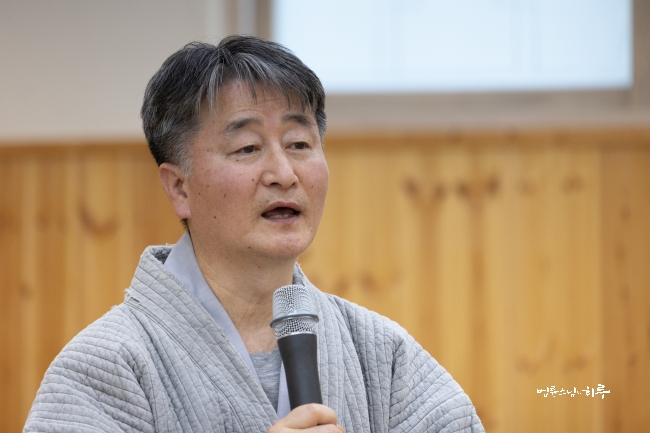
“Our group consisted of many middle managers. They said that they tended to neglect everyday life when they were busy with a lot of work. We mostly talked about the perspective we should have to be centered in everyday life and the attitude we should have when we work with people as a middle manager.”
“Our group had three people in their 20s, so we talked a lot about how to control our desires. Most of them are staff, so we also talked about how to resolve conflicts with department heads.”
Then, two people from each group shared their thoughts. First, one of the two trainees who were planning to leave the sangha after finishing this retreat had the floor.
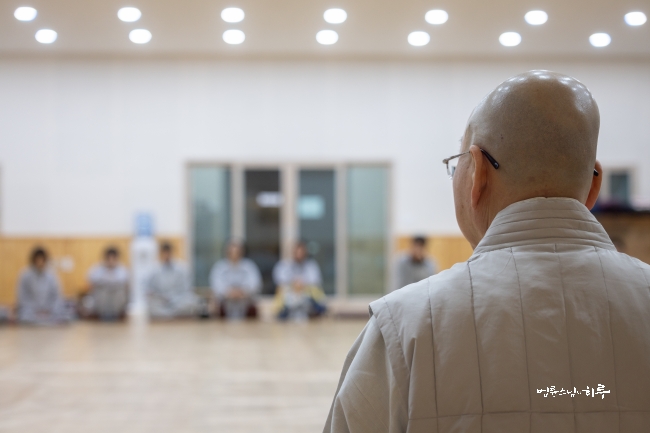
“On January 1st, 2022, I was born again today. When I first joined the sangha, I think my renunciation wasn’t genuine. I feel that I truly joined the sangha today. I wasn’t able to renounce the secular world because of my heavy karma, but the love, passion, persistence, and patience of my fellow practitioners finally made it possible.
“I thought that spreading the Dharma to 10,000 people was impossible. But, after experiencing that even my heavy karma can be cracked, my thoughts have been totally changed. The fact that someone as incorrigible as I can accept the Dharma proves that everyone in Korea can accept the Dharma. You who have cracked my karma have already succeeded in spreading the Dharma to 10,000 people.”
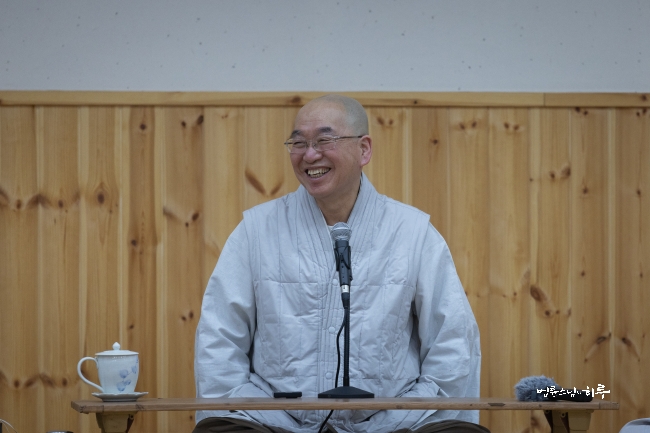
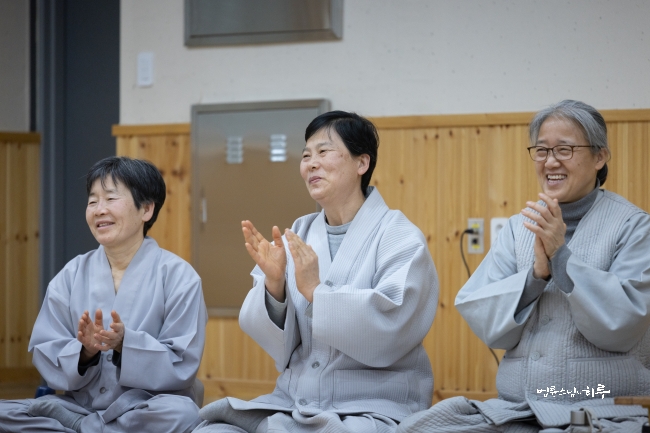
We started the new year lightheartedly as we laughed and cried. As we helped each other to become better practitioners, we all empathized with the teaching, “the most important thing is self-liberation.”
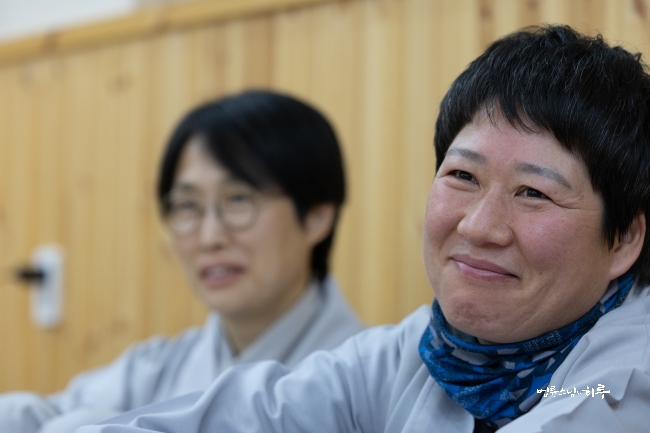
While we were listening to fellow practitioners’ stories of practice, the Sun had already set. Lastly, sangha members asked Sunim for a Dharma talk. Ven. Pomnyun Sunim talked about what a true miracle is.
Opening the door of your heart is a miracle
“Thank you for your stories. It would be wonderful to hear all of your stories if time permits, however, we always live under limited conditions. Therefore, we have to make choices in the given conditions. So, we’ll wrap this up with the stories of two or three people from each group.
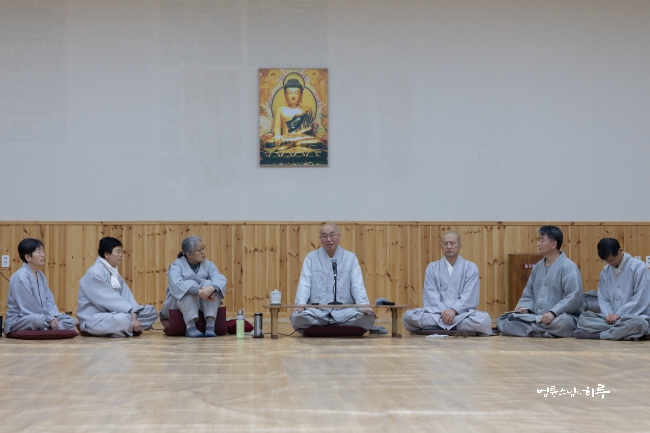
“We experience miracles in our lives, but a miracle is opening the door of your heart, rather than rain after a long drought or sudden stopping of floodwaters. As I listened to your stories today, I felt that a lot of miracles have taken place.
“With respect to practice, we can’t say that the more we practice, the better the results we will get, as is the case with schoolwork. We may attain sudden enlightenment according to the intensity of our practice, the level of our mental blockage, the level of our concentration on the task at hand, or our years of practice. The enlightenment stories of Zen masters in the old days show that enlightenment comes in many ways. One Zen master was enlightened when he stumbled over a stone while contemplating deeply about a question day and night; another master was enlightened while listening to a Dharma talk given for another person; and yet another was enlightened while reading a sutra.
“Sometimes you gain insight into the problems you’ve been mulling over while meditating, or participating in a retreat for Jungto practitioners, or Pavarana. Or you gain insight into a problem that you’ve been unable to solve for 10 or 20 years. And even though you think you’ve gained insight, you may realize after a while that a thicker wall remains inside. The lesson we can learn today is that fellow practitioners’ sharp advice is important in cracking one’s karma.
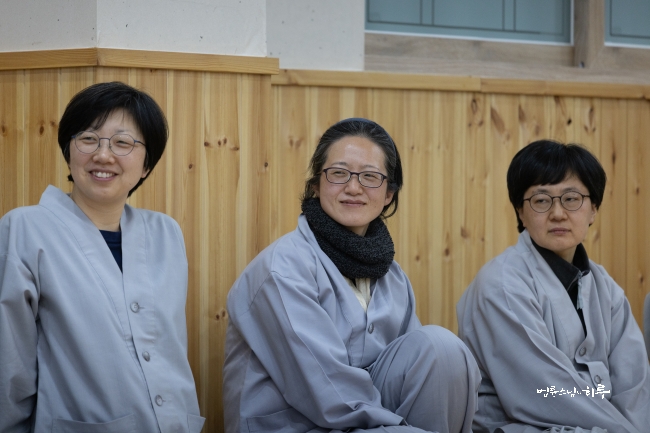
Expressing your feelings and thoughts lightheartedly
“Even a married couple can’t know each other’s feelings and thoughts unless they are expressed. Unless you talk about how you feel, your partner can’t know how you feel. Therefore, you need to express your feelings and thoughts to some extent. But, it’s easy for you to think, “Surely he should know how I feel?” When you live in a community, it is natural for you to follow a similar line of thought. But it is hard to know what’s in someone’s mind unless they express it—as the old saying goes: “Even though you know what’s in deep water, you don’t know what’s in someone’s mind.” During our sharing sessions, there are moments when you think, “How could she take it that way?”
“On the other hand, the people around you recognize your state of mind—such as being angry or judgmental, or having distracting thoughts—as if they can read your mind, no matter how hard you try to hide it. It seems that the people around you don’t know the things you think they should know, yet they know the things you don’t want them to know. When you like or dislike someone, they recognize it right away. In other words, if you lean toward something, people around you recognize it right away. Therefore you don’t have to take the trouble to hide your state of mind in such cases. On the other hand, it is hard for another person to know your feelings and thoughts unless you express them. In this sense, we need to express and communicate our feelings and thoughts accurately.
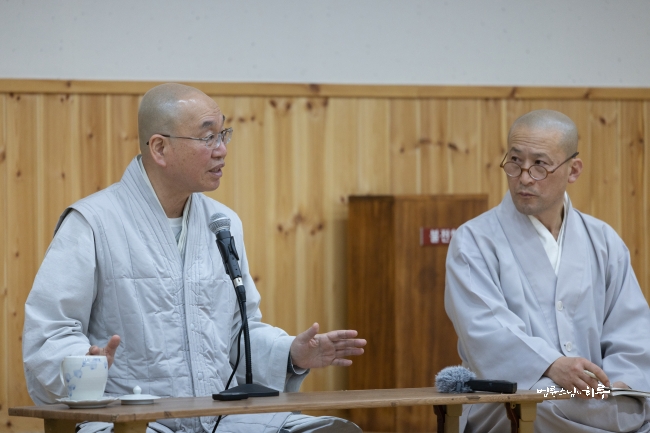
“To deal with both—the things you want others to know and the things you don’t want others to know—it is important to express and communicate your feelings and thoughts accurately. There’s no need to hide a feeling that the other person will find out even if you try to hide it. On the other hand, you need to express your feelings and thoughts lightheartedly because it’s hard for other people to know how you feel unless you express it—even if they are very close to you.
“When I counsel married couples, I see that misunderstandings often arise because they assume that their spouse knows. But the spouse doesn’t know, and they sometimes break up because of the misunderstanding and end up regretting it later. Therefore, you should express your feelings and thoughts lightheartedly in your everyday life. After living in a community for a long time, you tend to cover up your feelings instead of expressing them honestly, and sharing becomes a mere formality. During this retreat, you talked with each other honestly because you were determined to speak your mind. If you avoid or hide your feelings, you won’t be able to know how others feel, even if you’ve lived with them for ten years.
“As I was listening to your stories, several thoughts came to my mind from the perspective of practice, and Ven. Yusu and Ven. Bosu also asked for a Dharma talk on the perspective of practice. But I think it’s not necessary for me to talk more since your stories themselves were Dharma talks. So I’ll conclude my Dharma talk and let’s consider your stories as Dharma talks.”
Sunim’s Dharma talk was short, so our conversation moved on to social-engagement activities. In addition to the evaluation of the social-engagement activities Jungto Society has carried out for the last 30 years, including the environmental movement, peace movement, and poverty reduction movement, sangha members asked questions about the outlook for the next 30 years.
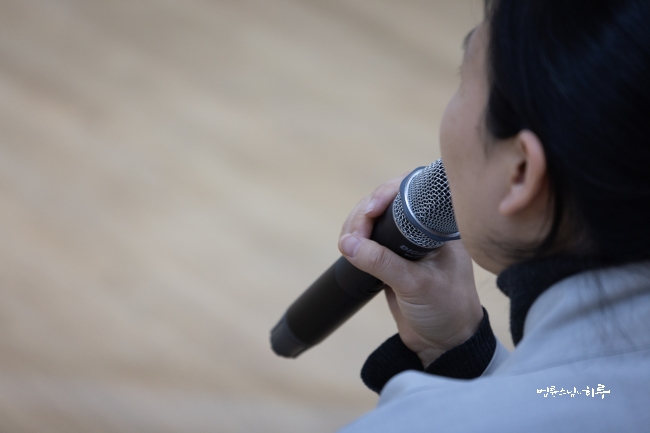
● I am curious to know the prospects for the sale of recycled items.
● Jungto Society’s decision-making is now based on the opinions of all members, which has its advantages, but it seems that the new system makes it difficult to cope with social changes in a timely manner. To cope with a world that is changing faster than ever, don’t we need a team that can experiment with preemptive measures?
● The characteristics of today’s children are different from those of Generation MZ. I think we also need to research happiness for these children.
● The climate crisis is growing more serious worldwide. I think that the environmental movement is as important as spreading the Dharma. I wonder about the direction of our environmental movement for the second 10,000-Day Practice.
After the conversation, Sunim concluded the meeting by talking about how sangha members should live as practitioners.
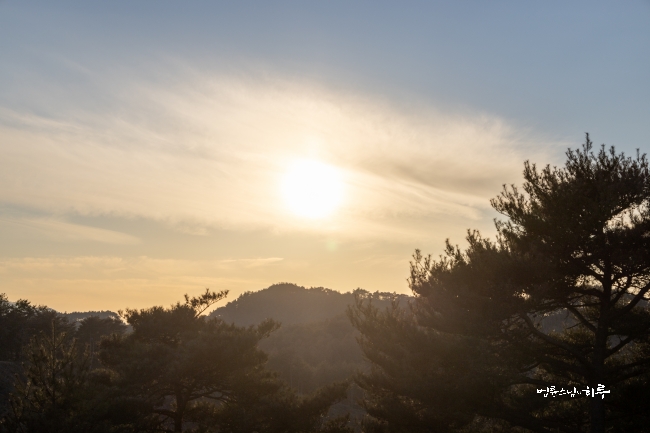
“We have to accept human desires as they are. Denying human desires is to move toward asceticism, whereas following desires is a cause of suffering. If we know that human suffering arises from desires, while acknowledging that humans have desires instead of denying them, we will naturally investigate how we can free ourselves from them. The sangha has to choose which path we will take in consideration of these factors. Jungto Society will continue to exist even if we don’t have Seoul Jungto Center, but once we forget our perspective on practice, there is no meaning in Jungto Society’s existence.
“Taking the Middle Path means you neither place a taboo on and reject desires, nor justify and follow desires. If we justify and follow desires, we will lose the principles of practice and become a group of religious adherents. Religious organizations are not much different from secular corporations. They have large congregations, receive a lot of donations, and have big facilities, but they reign over people rather than help them.
“If we look back on our aspiration when we first established Jungto Society, we aspired to return to the Buddha’s teachings. We reflected deeply on how we could live like the Buddha in this modern age, even if we couldn’t exactly live like him. In other words, we thought about what our standard of living should be to recreate the Buddha’s life in this modern age. We concluded that we should maintain a standard of living that was below average globally. This meant that we should maintain the lowest standard of living in Korea.
“We can check if we are following this principle faithfully against this standard. Let’s leave aside Dubuk Retreat Center because it is a converted old school building. But we have to think about whether people whose standard of living is lower middle class will think that our standard of living at Seoul Jungto Center or Mungyeong Retreat Center is higher than theirs. We should try to see from their point of view if our rooms are warmer, our food is better, our beddings are better, or our facilities are better than theirs.
“Some people hesitate to come to Mungyeong Jungto Retreat Center for practice because of its poor living conditions. Although they like to listen to Dharma talks, they hesitate to join Jungto Society because training programs are conducted at Mungyeong Jungto Retreat Center. So, there are people who hesitate to become Jungto Society members because of our poor living conditions, but there are also people who donate money or volunteer time that they can hardly afford because of the principles we live by. So we are facing an issue: which value should we choose?
“While going through the coronavirus pandemic, Jungto Society has shifted its operations to online. I think that the online system might be a key to solving this problem because it is difficult for people to break away from the consumerism they are so accustomed to. We can connect with them online while maintaining our way of life as renunciants—on the condition that they follow our way of life when they come to our places. In the past, one had to complete certain training programs conducted at our retreat centers to become a member of Jungto Society. Now, they are not required to do so. Therefore, what we can do is that we, sangha members, follow the sangha way of life and let the members follow their secular way of life while encouraging them to live life in moderation.
“People’s demands are justified from their point of view because they have lived like that. So we are left with the issue of how to find a balance between people’s demands and the principles of the sangha. We need to discuss and find a solution together. I am talking about something much more fundamental than dealing with inconveniences that sanga members feel in daily life, such as no holidays, to-dos, and not-to-dos. It is about contemplating what is a desirable life, how we should live even if we have only one day to live and the kind of life we want to live.
“Anybody who has been in a romantic relationship would know that it is accompanied by responsibilities. A couple in a romantic relationship can make demands on each other and they should satisfy each other’s demands. A romantic relationship is a relationship between two people, so you can’t always have your way. Marriage involves more responsibilities. Therefore, having a romantic relationship is not about abilities but about responsibilities. We need to seriously examine whether our desire for romantic love or sex works as a constraint, a shackle, or a pleasure in our lives. Nothing is presumed to be a certain way.
“We are living the way we are living now because we’ve found a point of balance that we think maintains a balance between afflictions from not satisfying our desires and losses from satisfying them. Each of you has found your own point of balance and has been living accordingly. As a result, you have regrets about both the desire-fulfillment part and the desire-non-fulfillment part. You have to sort this out. You may become free from certain desires naturally as you grow older, or by experiencing them or by not experiencing them. Some people have regrets because they experienced them and other people have regrets because they didn’t experience them. You need to examine this very carefully if you are distressed by desires while living in the sangha.
“There is no right way to live. You may live whatever life you choose. The Buddha said only five things about the way we should live.
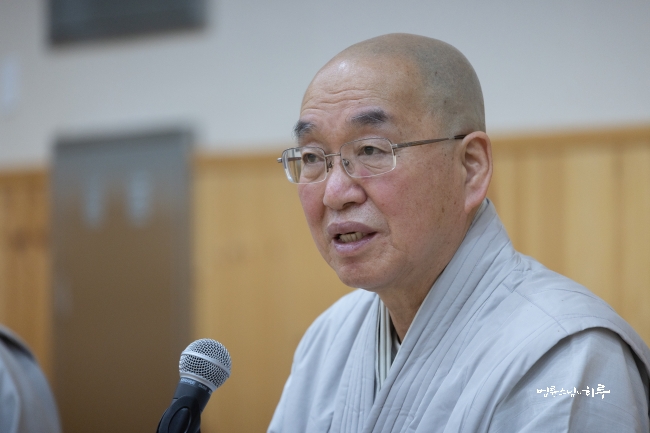
Do not harm others.
Do not inflict a loss on others.
Do not torment others.
Do not distress others with words.
Do not trouble others by getting drunk.
“If you refrain from committing one of these behaviors, how you live is up to you. In this respect, you need to think about how the sangha should live. You are living according to the rules made by your seniors, so you might find some of these rules inconvenient. We discussed a lot about how to live at first. After trying various methods, including wage payment, we agreed on living the way we are living now. You joined us after the rules had been established, so you might find them too rigid. You need to decide how to live through discussions.
“If we relax our rules, we may feel better for one or two years, but what about those who join the sangha with more relaxed rules in ten years? Will they have no complaints? I think it is very likely that they will have complaints, too. Then, we will have to adjust the rules again. Adjustment itself is not a problem. All systems require adjustment. However, if we are not aware of the kind of life we are going to live here while adjusting to the rules, our life may turn out to be not too different from the life we left behind. We have to guard against this.
“There is a story that alludes to this. A man went to climb Seoraksan. While climbing the mountain he saw beautiful flowers halfway up. As he stopped to pick some flowers, he saw a refreshing stream nearby. As he went to dip his feet in the cool water, he saw crawfish between the rocks and caught some. He looked around thinking what to do with the fish, and saw a small tourist home. He went there to cook the crawfish and found that the people sitting at the next table were from his neighborhood. He talked with them for a while and it got dark, so they gave him a ride home. He did what he thought was best at the moment, picking flowers, dipping his feet in the stream, and catching and eating crawfish, but ended up returning home without accomplishing his original goal, which was to climb the mountain.
“With this in mind, I want you to investigate how the sangha should live. You can always find things to improve in life—your jobs, rules, and so on. But if you deal with a problem temporarily, you may end up changing the same thing repeatedly without solving it fundamentally. Bear this in mind and investigate.”
We were able to understand what it means to find the Middle Path between fulfilling and suppressing desire.
Ven. Pomnyun Sunim’s New Year’s Day ended. His disciples thoroughly experienced the teaching that having good friends is the whole of the spiritual life, and the teacher went to bed happily after listening to his disciples’ stories all day long.
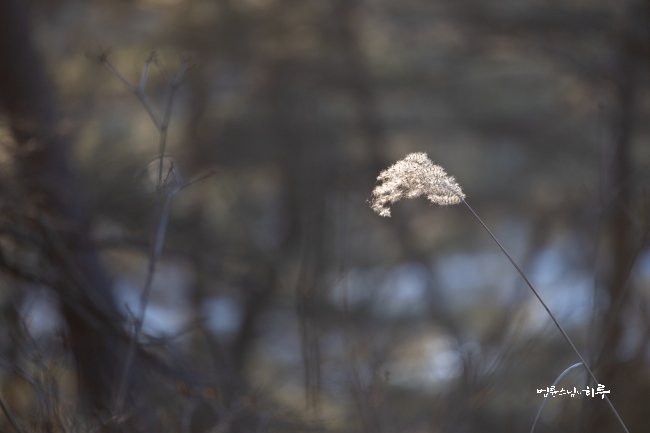
Tomorrow, Ven. Pomnyun Sunim will conduct the closing ceremony for the sangha’s retreat in preparation for the New Year in the morning. After that, he will go to Seoul and have a meeting with non-resident full-time staff in the afternoon and lead a live-streamed Sunday online meditation in the evening.
© 2024 Jungto Society - All Rights Reserved


